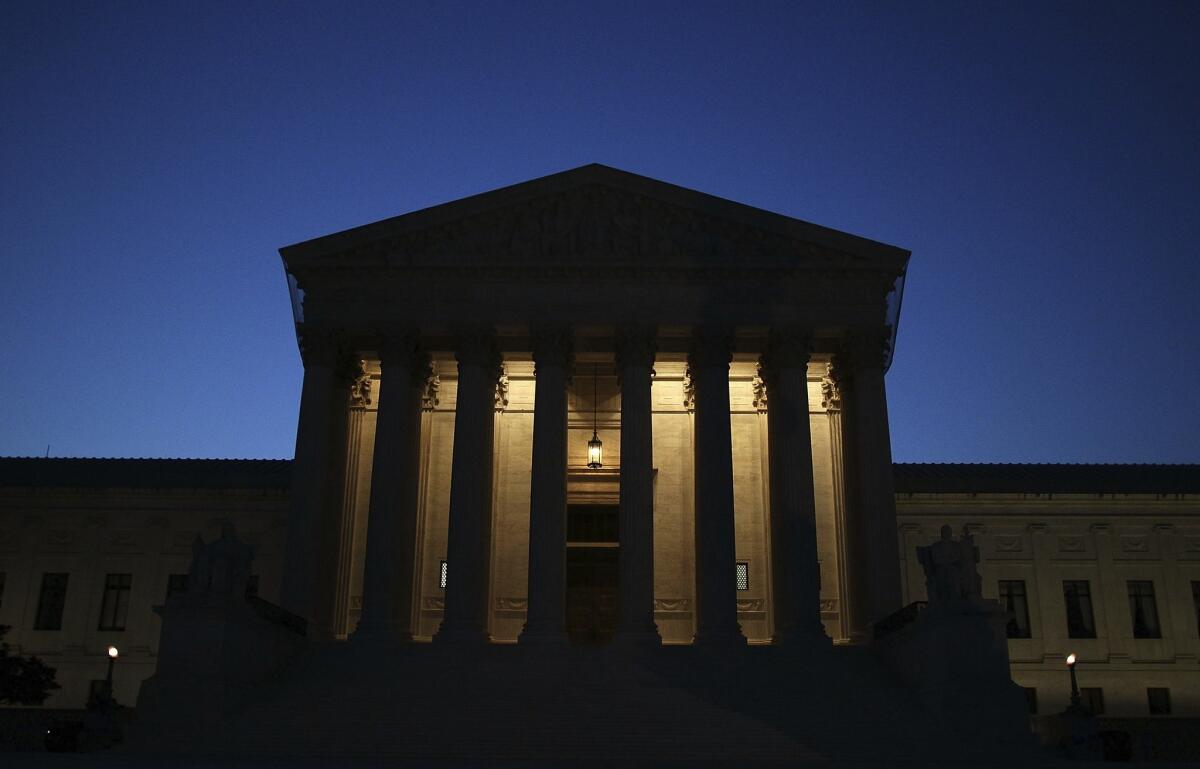Why the Supreme Court’s big Obamacare case never should have been filed

- Share via
King v Burwell, the lawsuit before the Supreme Court that conservatives regard as their last big hope to destroy the Affordable Care Act, has been coming apart on the merits for months.
Now there’s evidence that it was never even properly filed. Pressure is growing on the Supreme Court to drop the case because of doubts that its plaintiffs have any standing to sue: “It would be highly improper (and embarrassing) for the Court to decide the merits of such an important case” when there are such doubts, writes Gerard Magliocca of Indiana University school of law.
The fraying of the lawsuit’s claims and the doubts about its plaintiffs’ standing point to the fundamental problem with King v Burwell: it’s an ideological attack on Obamacare, ginned up by the Cato Institute among others, masquerading as a rule-of-law case.
Here’s the background.
King v Burwell asserts that it’s illegal for the government to be handing out tax subsidies for health plans in the individual market in roughly three dozen states that relied on the federal government to run insurance exchanges for them (via healthcare.gov) rather than setting up their own state exchanges.
The case relies on a five-word phrase in one provision of the Affordable Care Act, which refers to “exchanges established by the state.” The lawsuit’s promoters say that rules out subsidies in healthcare.gov states.
The problem with this argument is that it’s contradicted by the rest of the ACA; by the explicit goals of the ACA (which include bringing affordable insurance to all Americans); by the Congressional drafters of the bill, who say the idea always was to deliver subsidies to all who qualified by income; and by the governors of several healthcare.gov states, who say they never thought their failure to set up state exchanges would deprive their citizens of subsidies.
Moreover, according to judicial precedent, the executive branch is empowered to interpret any ambiguity in a law to resolve the problem, as long as the interpretation is plausible according to that law. In this case, the IRS ruled that the law means that subsidies are available in all states.
Affordable insurance for least 5 million and possibly more than 8 million Americans who receive subsidies for their health plans in those three dozen states hangs in the balance. If the Court rules for the plaintiffs, the individual insurance markets in those states are likely to collapse.
That brings us to the latest wrinkle, the question of “standing.” The Constitution effectively states that lawsuits in federal courts can only be brought by plaintiffs who reasonably believe they have been injured by the defendant (in this case, the government by enforcing the ACA). Those plaintiffs have standing to sue.
For the King case, anti-Obamacare forces appear to have conjured up their legal argument first, then went trawling for plaintiffs to put their names to the complaint. It looks like they may have botched the job.
Recent articles by the Wall Street Journal (here and here) and Mother Jones cast doubt on whether the four named plaintiffs in King v Burwell actually have suffered any injury.
The top named plaintiff, David King, turns out to be a Vietnam veteran who is likely eligible for free medical care through the VA. The Journal reports he already holds a VA identification card and has received VA care, which means he’s not required to sign up for insurance via Obamacare and isn’t affected by its insurance mandate.
A second plaintiff, Doug Hurst, is also a Vietnam vet and also has reported income that would make him eligible for large subsidies for ACA plans, undermining his claim to be injured by the ACA.
Plaintiff Brenda Levy will be eligible for Medicare in June, probably before the Supreme Court rules on the case, and thus has “no stake in the case once she turns 65,” says Nicholas Bagley of the University of Michigan. “It will be moot as to her.” She told Mother Jones she has no idea how she ended up being named as a plaintiff.
Finally, it’s uncertain that plaintiff Rose Luck even lives in a healthcare.gov state. Her listed address is an extended-stay motel in Virginia, but she’s no longer there. Anyway, she apparently is destitute and therefore unlikely to be required to buy even subsidized insurance under the law.
Some of these plaintiffs may indeed have standing, but the uncertainties of their situations underscores the slipshod nature of King v Burwell. Before they landed on the list, one of the lawsuit’s chief promoters, Michael Cannon of the Cato Institute, tried to recruit former Cato interns as plaintiffs. No such persons ended up on the lawsuit.
Standing is a technicality but it’s not trivial. The issue plays into the Court’s decision to take the King case, which surprised many legal observers because lower courts were still pondering the issues it raised.
Bagley conjectures that “had the Court been apprised of concerns about plaintiffs’ standing when it agreed to take King in November, it might well have taken a pass.” Legal experts say the plaintiff lawyers, who represent the conservative Competitive Enterprise Institute, have a duty to report any doubts about standing to the Court.
Nothing prevents the Court from ruling on King even if the plaintiffs don’t have standing to sue, but legal experts say the justices should at least address the issue. The most likely method may be for them to request supplemental briefs from the parties before they hear oral arguments next month. Either way, the standing mess adds one more joke to a case that already seemed absurd.
Keep up to date with the Economy Hub. Follow @hiltzikm on Twitter, see our Facebook page, or email mhiltzik@latimes.com.
More to Read
Inside the business of entertainment
The Wide Shot brings you news, analysis and insights on everything from streaming wars to production — and what it all means for the future.
You may occasionally receive promotional content from the Los Angeles Times.











